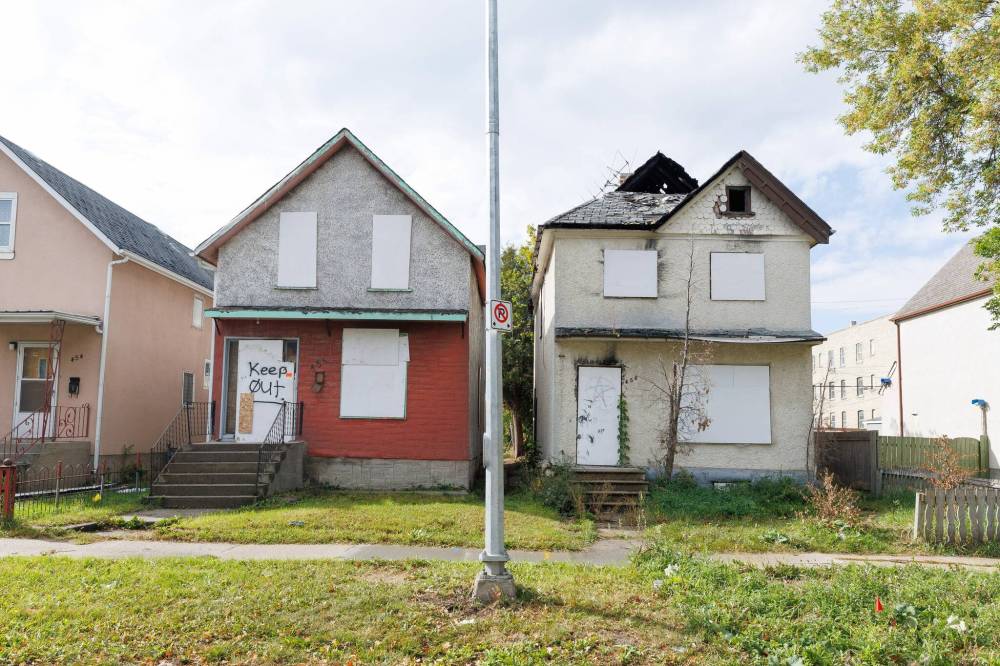Mayor Scott Gillingham has put delinquent property owners on notice that if they continue to leave their homes vacant, boarded up and uninhabitable for extended periods of time, the city may seize their property without compensating them.
But it will take more than words to convince delinquent property owners that the city is truly serious about taking such extreme measures.
“I recognize that’s a very serious statement to make, but enough is enough,” Gillingham said last week. “The people of these communities shouldn’t have to continue to put up with property owners who are delinquent and are just not caring for their properties.”

MIKAELA MACKENZIE / FREE PRESS FILES
Mayor Scott Gillingham has announced that if delinquent property owners continue to leave their homes vacant for extended periods of time, the city may seize their property without compensation.
What the mayor is talking about is using an existing process called “take title without compensation.” It allows the city to seize an abandoned building from a property owner without paying them for it. In theory, the city can take the property, spend whatever amount is required to clean it up or demolish it, sell it and hopefully at least break even.
Trouble is, it’s a lengthy legal process regulated by provincial legislation and includes many steps before a property can be seized. The process can’t even begin until the property owner is charged and convicted under the vacant building bylaw.
It has been done, just not in recent years.
Between 2010 and 2016, 16 properties were seized under that process, but none since. The city says it became more difficult to do after the province made legislative changes in 2017 under the Provincial Offences Act and the Municipal By-law Enforcement Act.
“These pieces of legislation provided municipalities with some streamlined enforcement options that have resulted in fewer bylaw prosecutions through the courts, which means fewer findings of guilt,” a city spokesperson said in an email. “This has made it more challenging to initiate and complete the entire TTWC (take title without compensation) process than prior to the introduction of the (Provincial Offences Act) and the (Municipal By-law Enforcement Act), when the city was completing TTWC more often.”
That may explain some of it, but there’s more to it than that.
The city has tried various ways of prodding delinquent property owners into repairing their homes and making them habitable again, including charging various fees for boarded up and empty buildings. But it hasn’t worked in most cases. There are more abandoned and derelict homes in Winnipeg than ever before, according to the city.
Something has to give. And that something has to be the city finding the political will to start seizing some of these properties again to show delinquent property owners that city hall is serious about cracking down on them.
If changes are needed to provincial legislation to streamline the process, it appears the city has an alley in the NDP government. Premier Wab Kinew said last year he’d like to see more derelict homes expropriated by government and turned into housing to help reduce homelessness.
“Cities and municipalities do have expropriation powers, but if there’s more that’s required, we’re open to that,” Kinew said in December.
Gillingham should take the premier up on that.
Still, none of this excuses the city for failing to use existing measures to seize properties from delinquent owners. It may be that it became more difficult to do under the 2017 legislative changes, but it’s not impossible.
In many cases, the city is simply not going after property owners who refuse to keep their buildings in good repair.

MIKE DEAL / FREE PRESS FILES
The city is littered with empty and boarded up buildings that are not in compliance with the vacant building bylaw, whether it’s refusing to repair holes in their structures or failing to properly secure them.
The city is littered with empty and boarded up buildings that are not in compliance with the vacant building bylaw, whether it’s refusing to repair holes in their structures or failing to properly secure them.
Some – maybe not all – could be charged and prosecuted under the bylaw, resulting in some convictions. The city could then begin the process of seizing at least some properties.
It doesn’t always work because the law gives property owners multiple opportunities to comply with the bylaw. But in cases where the property owner refuses, the city can – and has – taken the property without paying the owner for it.
Even if the city can’t do it in all cases, it has to start using the process again to send a message to delinquent property owners that the city is serious about coming after them.
Words aren’t enough.
City hall already does so with owners who don’t pay their property taxes. According to the city, 116 properties have been seized that way over the past 10 years. Confiscating a property through that process is a lot more cut and dried than through the TTWC, which delinquent property owners can avoid if they pay all their taxes and fees (which many do) and comply with bylaw orders when the city issues them.
But it has been done.
Gillingham’s warning to property owners is a good start. But it has to be backed up with concrete action.
tom.brodbeck@freepress.mb.ca

Tom Brodbeck
Columnist
Tom Brodbeck is a columnist with the Free Press and has over 30 years experience in print media. He joined the Free Press in 2019. Born and raised in Montreal, Tom graduated from the University of Manitoba in 1993 with a Bachelor of Arts degree in economics and commerce. Read more about Tom.
Tom provides commentary and analysis on political and related issues at the municipal, provincial and federal level. His columns are built on research and coverage of local events. The Free Press’s editing team reviews Tom’s columns before they are posted online or published in print – part of the Free Press’s tradition, since 1872, of producing reliable independent journalism. Read more about Free Press’s history and mandate, and learn how our newsroom operates.
Our newsroom depends on a growing audience of readers to power our journalism. If you are not a paid reader, please consider becoming a subscriber.
Our newsroom depends on its audience of readers to power our journalism. Thank you for your support.